8 Inflammatory Foods That Are Giving You Belly Fat
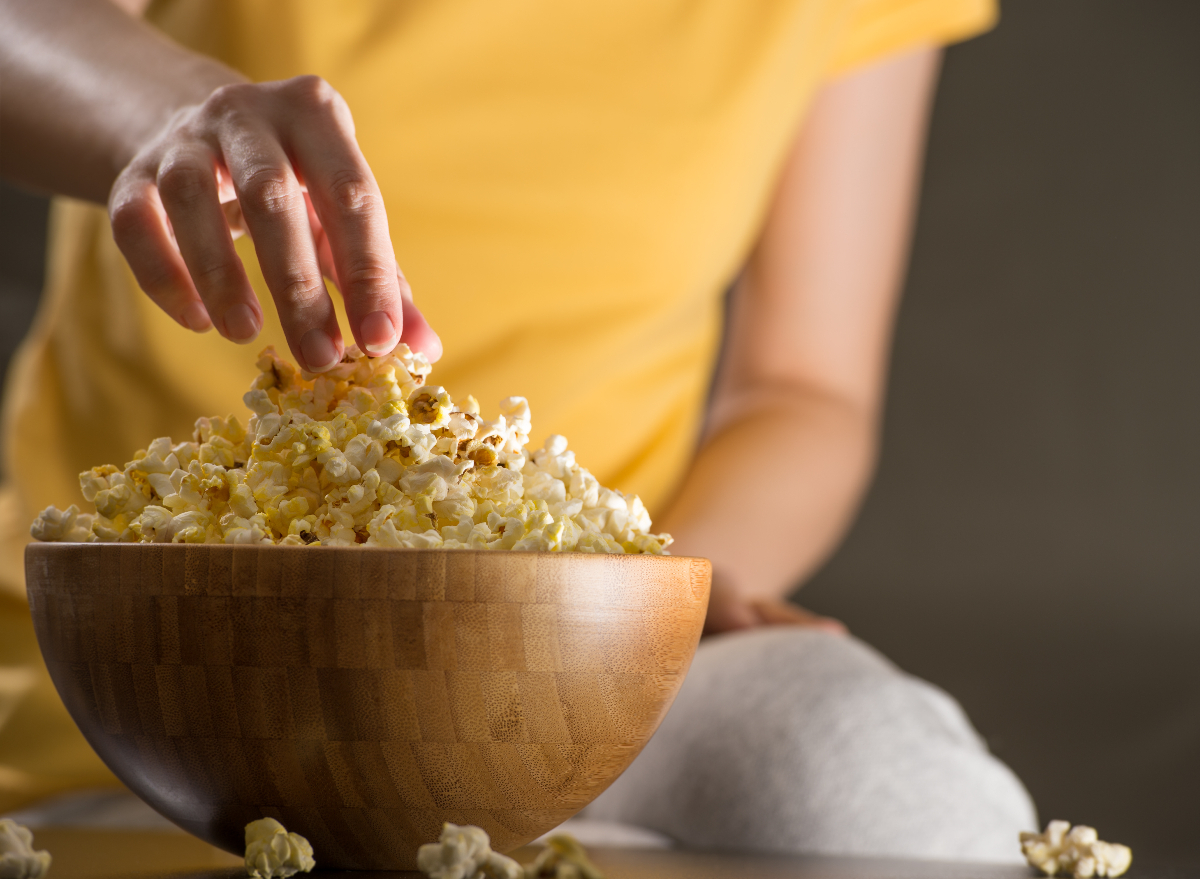
Belly fat can pose a risk to your health by leading to serious complications, such as diabetes, high blood pressure, heart disease, cancer, and liver and kidney issues, research says. Your genetics play a role in where your body stores fat, and your eating habits can influence fat storage as well. The types of food you choose, portions, and timing can all play a role in body fat. In particular, there are certain foods that may be more likely to lead to abdominal fat. Today, we’re calling out eight inflammatory foods that cause belly fat so you can nix them from your diet as soon as possible.
The fat around your abdomen can be one of two types: subcutaneous or visceral. While too much of either can be harmful to your health, visceral fat is the type that is more concerning. Visceral fat surrounds the organs within your abdomen and is associated with an increased risk for chronic diseases. Subcutaneous fat sits just below your skin, allowing it to be less harmful to your health. In fact, this form of body fat provides some protection to organs and aids your body in temperature regulation. This makes a healthy amount of subcutaneous fat beneficial to your body.
Although genetics, gender, age, and hormones can influence body fat distribution, your lifestyle can have a significant impact on your belly fat. If you have noticed an increase in your abdominal fat, there are a few dietary practices that may help. Aim to increase your fiber intake, reduce your alcohol consumption, eat more lean protein, and skip food and drinks with added sugar. To take it a step further, avoid these eight inflammatory foods that cause belly fat.
Pastries
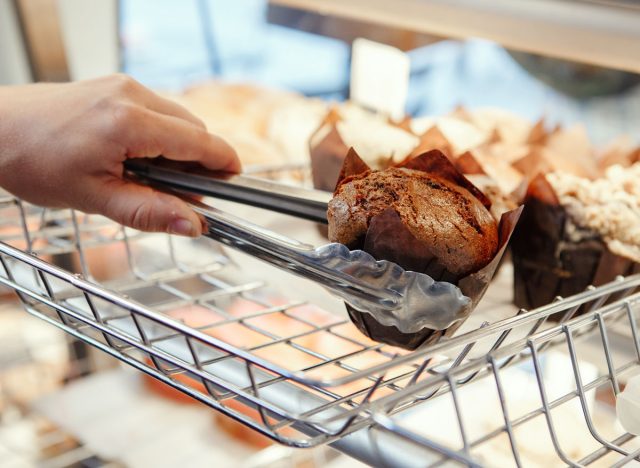
While a homemade muffin or bread may be easier on your waistline, commercially prepared pastries often pack in excess sugar and come with a high calorie count. Muffins, croissants, and quick breads are also a source of trans fat, another inflammatory nutrient that could give you belly fat. Trans fats naturally occur in small amounts; however, the majority of the trans fats in our food supply are man-made. These fats are often used as a cheaper shelf-stable alternative to butter and have been shown to increase inflammation and cardiovascular disease (CVD), among other illnesses.
If you have a craving for a pastry, try making them at home with better quality fats, like olive oil, and limit the commercially prepared treats you enjoy.
White Bread
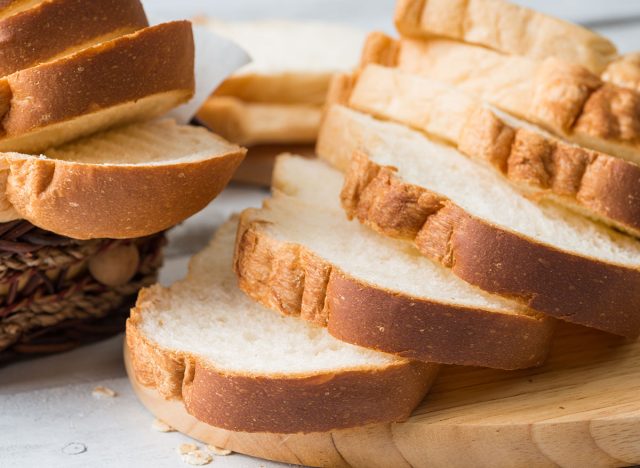
A staple in many households, white bread is not known for being a nutrient-dense food. Some options contain small amounts of added sugar, but the bigger culprit here is the low fiber content. Fiber can increase satiety and stabilize hunger, which could lead to better food choices and appropriate energy intake. Additionally, fiber intake is associated with reduced belly fat. Many refined carbs, including white bread, cereal, crackers, and other common snacks are low in fiber.
The Dietary Guidelines for Americans recommends women consume 22 to 28 grams of fiber daily, depending on age, while men should get 28 to 34 grams. Beans, lentils, nuts, seeds, oatmeal, whole grain products, fruits, and vegetables are notable sources of dietary fiber.
Cereal
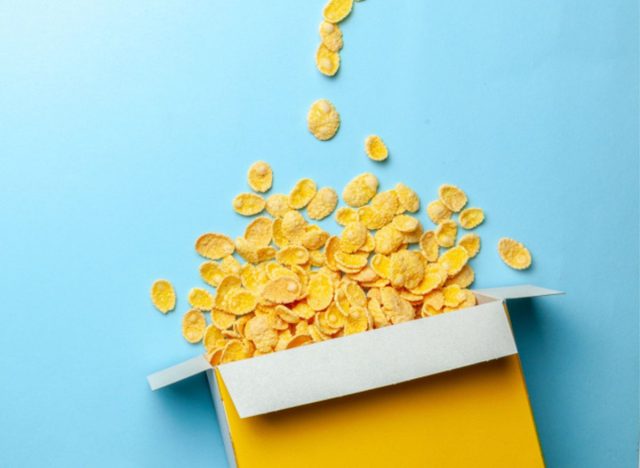
You may be surprised to see such a popular breakfast staple on this list of inflammatory foods that can cause belly fat. Known for making an easy breakfast or quick snack on the go, some cereals aren’t doing your waistline any favors—specifically the ones that are packed with sugar. Options that contain added sugar and zero fiber are the worst offenders. Not only can the sugar lead to inflammation and belly fat, but it could also disrupt your gut microbiome. Research shows that imbalances in your gut bacteria could increase your risk of obesity, CVD, and gut disorders, and may also promote weight gain. Additionally, microbiota imbalances could lead to higher visceral fat.
There are plenty of low-sugar cereals available, so choose options with fewer than five grams per serving, and stick to a single serving as your portion size.
Soda

A single can of regular soda contains about 40 grams of added sugar, an amount that exceeds the daily recommendation of the American Heart Association. Research shows that excessive dietary sugar can increase body inflammation and lead to insulin resistance and chronic inflammation.
Soda contributes empty calories, potentially leading to weight gain, and can overwhelm the liver, encouraging these excess calories to be turned into fat. While soda is one of the most popular sugar-sweetened drinks, other sweetened drinks, like juice, energy drinks, coffee drinks, and sweet tea may also be culprits of your belly fat.
If you are looking for carbonation, try unsweetened carbonated water or low-sugar soda alternatives, like OLIPOP. Not only does this option have fewer than five grams of sugar per can, but it also contains fiber, a nutrient that may support the healthy bacteria in your gut.
Mixed Drinks

Another drink that is likely destroying your abs, sugary alcoholic drinks provide a double whammy of abdominal inflammation. A single margarita can easily have over 30 grams of added sugar, contributing to inflammation and belly fat. Additionally, on its own, alcohol can cause inflammation and potentially lead to issues within the liver and gut. Research shows that alcohol is also associated with greater amounts of visceral fat, leading to another set of potential health complications.
To reduce the negative impact of your beverages, choose drinks without any added sugar, and avoid heavy alcohol consumption defined as more than two alcoholic drinks per day.
Microwave Popcorn
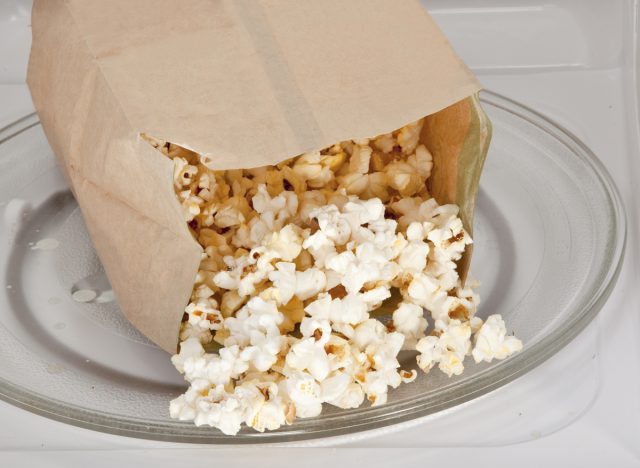
Microwave popcorn is another one of the worst inflammatory foods that can cause belly fat. This common snack has one thing going for it: fiber. Popcorn is a source of essential fiber, but it often comes along with loads of sodium and trans fat. Highly buttered and flavored options are likely the varieties with the highest amounts of these worrisome nutrients. We know trans fats can lead to inflammation and belly fat, but excess sodium intake may also lead to inflammation and increased body fat.
Popcorn on its own can be a nutritious snack, so instead of the flavored options, try air-popped kernels topped with grated Parmesan cheese for a light salty flavor that contains far less sodium and no trans fats.
Meal Replacement Bars
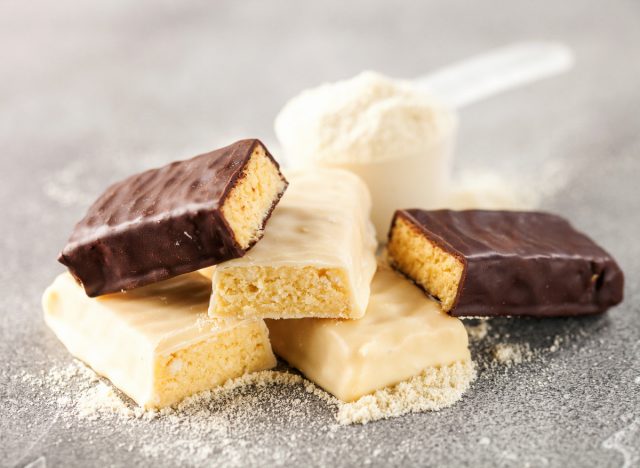
Although these options make it easy to get calories when you are busy or on the go, they often don’t contain the best ingredients. Many have added sugar, a known inflammatory ingredient that could be leading to belly fat, and may also contain trans fat and little to no fiber. A triple whammy to your belly fat, you are better off choosing whole foods for your meal.
If bars are too easy to pass up, look for options with fewer than five grams of added sugar, zero trans fat, and at least three grams of fiber. Alternatively, consider some easy meals from home. For example, consider preparing deli turkey wrapped around a part-skim cheese stick with an apple and peanut butter on the side.
Chips
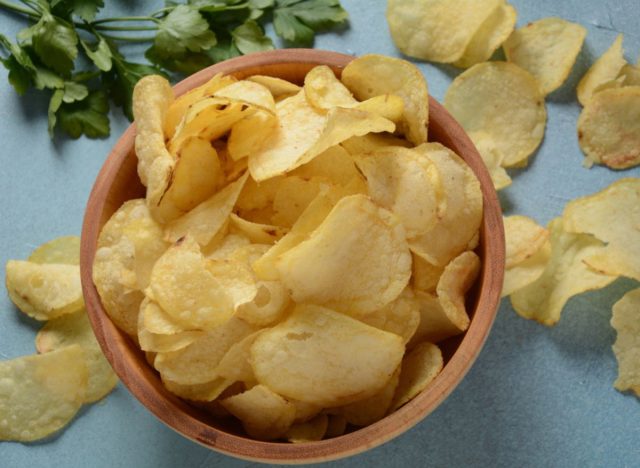
The last of these inflammatory foods that cause belly fat is chips. Another salty, crunch snack that could be leading to inflammation and belly fat, chips are notorious for their sodium content. This salt can lead to inflammation and adiposity, and the trans fats often found in chips may do the same. While there is zero need for any trans fat in your diet, sodium is actually an essential nutrient. Lightly salted chips can provide the balance of salt you may be craving while avoiding excess, and options cooked in non-hydrogenated oils will help you avoid trans fats. As a rule of thumb, if you see “hydrogenated” or “partially-hydrogenated oil” in the ingredient list, there is likely some amount of trans fat in the chips.
- Source: https://www.ncbi.nlm.nih.gov/pmc/articles/PMC7431389/
- Source: https://www.ncbi.nlm.nih.gov/pmc/articles/PMC6702693/
- Source: https://www.ncbi.nlm.nih.gov/pmc/articles/PMC6451787/
- Source: https://www.ncbi.nlm.nih.gov/pmc/articles/PMC3856431/
- Source: https://www.dietaryguidelines.gov/sites/default/files/2020-12/Dietary_Guidelines_for_Americans_2020-2025.pdf
- Source: https://pubmed.ncbi.nlm.nih.gov/31315227/
- Source: https://www.ncbi.nlm.nih.gov/pmc/articles/PMC7333005/
- Source: https://www.heart.org/en/healthy-living/healthy-eating/eat-smart/sugar/how-much-sugar-is-too-much
- Source: https://www.ncbi.nlm.nih.gov/pmc/articles/PMC9471313/#:~:text=It%20has%20been%20shown%20that,inflammation%20(39%2C%2040).
- Source: https://www.ncbi.nlm.nih.gov/pmc/articles/PMC2842521/
- Source: https://pubmed.ncbi.nlm.nih.gov/29848904/
- Source: https://www.ncbi.nlm.nih.gov/pmc/articles/PMC3934330/









